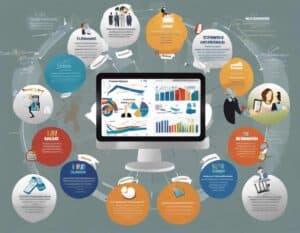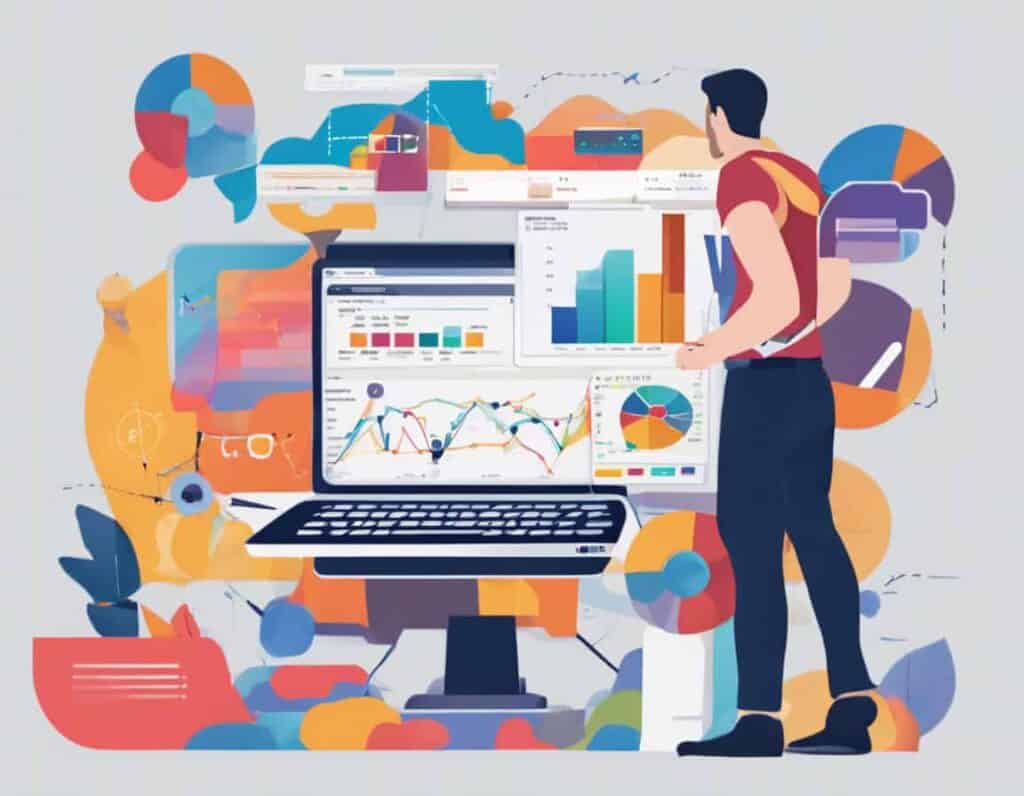Sales teams are the backbone of any successful business, and choosing the right field sales management software is crucial for enhancing their efficiency and productivity. As far as managing your on-the-go sales representatives, security should be a top priority.
In this blog post, we will discuss the importance of choosing a secure software like Beest.app for your sales team’s success.
Understanding Field Sales Management Software
Field sales management software is a technology solution that helps businesses effectively manage their sales representatives who are out in the field.
It allows companies to track the performance of their sales team, optimize their routes, and provide real-time updates on sales activities.
Key Features of Effective Field Sales Software
- GPS Tracking: Enables real-time monitoring of field sales representatives’ locations to enhance accountability and coordination.
- Route Optimization: Automatically calculates the most efficient routes for sales visits, reducing travel time and fuel costs.
- CRM Integration: Seamlessly syncs with existing CRM systems to ensure up-to-date customer information and streamlined data management.
- Performance Analytics: Offers detailed analytics and reporting tools to measure and improve the productivity and effectiveness of the sales team.
- Mobile Accessibility: Allows sales reps to access and update critical information from their mobile devices, even when offline.
- Secure Data Management: Protects sensitive customer and business data with robust encryption and compliance with data protection standards.
- Automated Scheduling: Streamlines the planning and execution of appointments and follow-ups to maximize sales opportunities.
- Customizable Dashboards: Provides personalized dashboards to help sales managers and reps visualize key metrics and performance indicators.
The Risks of Field Sales Software with Weak Security Protocols
In today’s digital landscape, field sales management software is a cornerstone of many businesses, but it’s not without risks. Weak security protocols can expose a company to various threats, undermining the efficiency and safety of their operations.
Here are five risks associated with field sales software that lacks robust security measures.
A. Data Breaches
Insecure field sales software can lead to data breaches, exposing sensitive customer information, financial records, and proprietary business data.
These breaches not only result in financial losses but also damage a company’s reputation and erode customer trust.
The recovery process can be lengthy and costly, involving legal fees, fines, and the need to implement new security measures.
B. Identity Theft
Weak security can allow cybercriminals to steal the identities of customers or sales representatives.
This can lead to unauthorized transactions, fraud, and long-term damage to individuals’ credit ratings.
Businesses may face legal repercussions and the need to provide support to affected individuals.
C. Operational Disruption
When security flaws are exploited, they can cause significant operational disruptions.
Sales teams may be unable to access the software, leading to downtime, missed sales opportunities, and delayed customer service.
Recovery from such disruptions requires time and resources, diverting attention from core business activities.
D. Compliance Violations
Field sales software that fails to meet regulatory standards like GDPR or PCI can result in hefty fines and legal issues.
Non-compliance can also lead to restrictions on business operations and the need to overhaul data handling procedures, further impacting business continuity and growth.
E. Loss of Competitive Edge
A security breach can lead to the loss of proprietary information, such as pricing strategies, marketing plans, and customer lists.
This compromises a company’s competitive position in the market. Restoring competitive advantage requires significant effort and investment in innovation and marketing.
Evaluating and Selecting Secure Field Sales Management Software
In the face of rising cyber threats, choosing secure field sales management software has become a critical task for businesses aiming to protect their operations and customer data.
Security should be a top priority in the selection process to prevent breaches and ensure compliance with data protection regulations.
A robust field sales management software not only enhances productivity but also safeguards sensitive information. Here are some essential criteria to assess when evaluating the security features of such software.
- Data Encryption: Ensure all data is encrypted during transfer and while stored, to keep sensitive information secure from unauthorized access.
- Access Controls: Implement strong access controls to restrict data viewing and modification solely to authorized personnel, thereby minimizing the risk of internal and external breaches.
- Regular Security Audits: Opt for a software provider that performs frequent security audits to detect and remediate vulnerabilities promptly.
- Two-Factor Authentication (2FA): Enhance security by requiring two forms of verification for user access, significantly reducing the likelihood of unauthorized entry.
- Real-Time Threat Detection: Choose software that offers real-time threat detection and alerts to quickly identify and respond to potential security issues.
- Secure Cloud Storage: Ensure the software uses secure, compliant cloud storage solutions to protect data integrity and availability, even in the event of hardware failure.
Selecting the right field sales management software with robust security features is essential for protecting your business from cyber threats and ensuring smooth operations.
By prioritizing these key security criteria, you can confidently safeguard your customer data and maintain the integrity of your sales processes.
Beest.app as a Model for Security
In the rapidly evolving world of sales, security is paramount. Beest.app emerges as a comprehensive solution, offering a robust field sales management software that prioritizes security while enhancing operational efficiency.
This all-in-one sales software is designed to streamline sales processes with advanced security measures, ensuring that every transaction and data exchange is protected.
Beest.app sets a high standard for security in field sales management with several key features.
1. Access Authentication
Beest.app employs two-factor authentication and secure identification processes to prevent unauthorized access.
This adds an extra layer of security, crucial for maintaining the integrity and confidentiality of sales operations.
2. Secure Vault
All user data within Beest.app is encrypted, adhering to GDPR and PCI standards.
This ensures ultimate data protection and secure payment processing, making it robust against data breaches and compliance violations.
3. Unified Connections
The platform uses open APIs and standard integrations to connect securely with CRM, ERP, Payroll, and payment systems, maintaining GDPR compliance and offering a scalable cloud-native solution.
4. Unplugged Security
Beest.app allows for secure offline access to critical information, syncing data once online within a GDPR-compliant cloud solution.
This is invaluable for sales teams operating in remote areas or without constant internet access.
5. Shielded Operations
The software incorporates digital contracts with secure authentication and two-factor authentication, sealing every deal and protecting every aspect of sales operations from unauthorized access and data breaches.
Advantages of Using Beest.app for Field Sales Teams
Beest.app is a powerful tool for field sales teams, providing advanced features that enhance productivity, security, and efficiency.
By leveraging this software, sales teams can operate more effectively, ensuring that data is protected and processes are streamlined. Here are some advantages of using Beest.app for your field sales operations.
- Enhanced Data Security: Beest.app ensures data security and compliance with GDPR and PCI standards.
- Streamlined Operations: The software offers secure, efficient data integrations that streamline sales processes.
- Offline Functionality: Beest.app enables continuous operation and data integrity, even in offline mode.
- Robust Protection: It offers strong defense against unauthorized access and data breaches.
- Easy Transition: The transition to Beest.app requires minimal IT department involvement.
- Real-Time Analytics: Provides instant access to performance analytics and metrics to inform decision-making.
- Mobile Accessibility: Allows field sales reps to access and update data from their mobile devices seamlessly.
- Customizable Interfaces: Users can tailor the interface and workflows to suit their specific needs and preferences.
- Automated Reporting: Automates the generation of reports, saving time and improving accuracy.
- Collaborative Tools: Facilitates collaboration among team members with shared calendars, notes, and real-time updates.
Using Beest.app empowers field sales teams to optimize their productivity and maintain high levels of data security and operational efficiency.
Implementing Beest.app in Your Sales Processes
To fully leverage Beest.app in your sales processes, start by training all team members on the platform’s two-factor authentication and secure identification processes. This foundational step ensures that everyone understands how to protect sensitive information and access the system securely.
It’s also crucial to regularly update and review access controls and security settings, as this maintains data integrity and aligns with evolving security needs.
Additionally, make the most of Beest.app’s unified connections feature, which securely integrates all relevant systems to enhance data flow and operational efficiency.
This integration is essential for a seamless transfer of information across different platforms.
Don’t forget to utilize the offline functionality of Beest.app to keep your sales team productive, even in areas with limited or no internet access.
Regular monitoring and evaluation of security protocols are also vital to swiftly adapt to new threats and meet changing operational needs, ensuring your sales processes remain robust and responsive.
Final Thoughts | Secure Your Success with Beest.app
In today’s dynamic business landscape, selecting Beest.app as your field sales management software is a strategic decision for the future.
With its robust real-time tracking, automated reporting, and fortified data storage, Beest.app isn’t just about managing your sales team; it’s about empowering them.
It ensures that your team remains laser-focused on their primary mission – selling – without the constant concern over data security.
Invest in Beest.app today for a secure, streamlined field sales management experience that sets your team up for unparalleled success.
Frequently Asked Questions
What makes Beest.app’s security features unique?
Beest.app combines two-factor authentication, secure data encryption, and seamless integrations with a focus on GDPR and PCI compliance, making it a uniquely secure choice for field sales management.
How does Beest.app ensure data security in offline mode?
Beest.app stores data locally in the app and syncs it securely once online, maintaining data integrity and compliance even without internet access.
Can Beest.app integrate with existing CRM and ERP systems?
Yes, Beest.app uses open APIs and standard integrations to connect securely with various systems like CRM, ERP, Payroll, and payment gateways.
How does Beest.app protect against unauthorized access?
Through robust features like two-factor authentication, secure identification, and real-time fraud control, Beest.app ensures strong protection against unauthorized access.
Is Beest.app suitable for small and large sales teams?
Absolutely, Beest.app’s scalable, cloud-native solution is designed to cater to the needs of both small and large sales teams, ensuring security and efficiency across all operations.



















